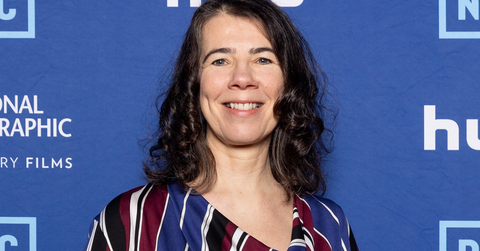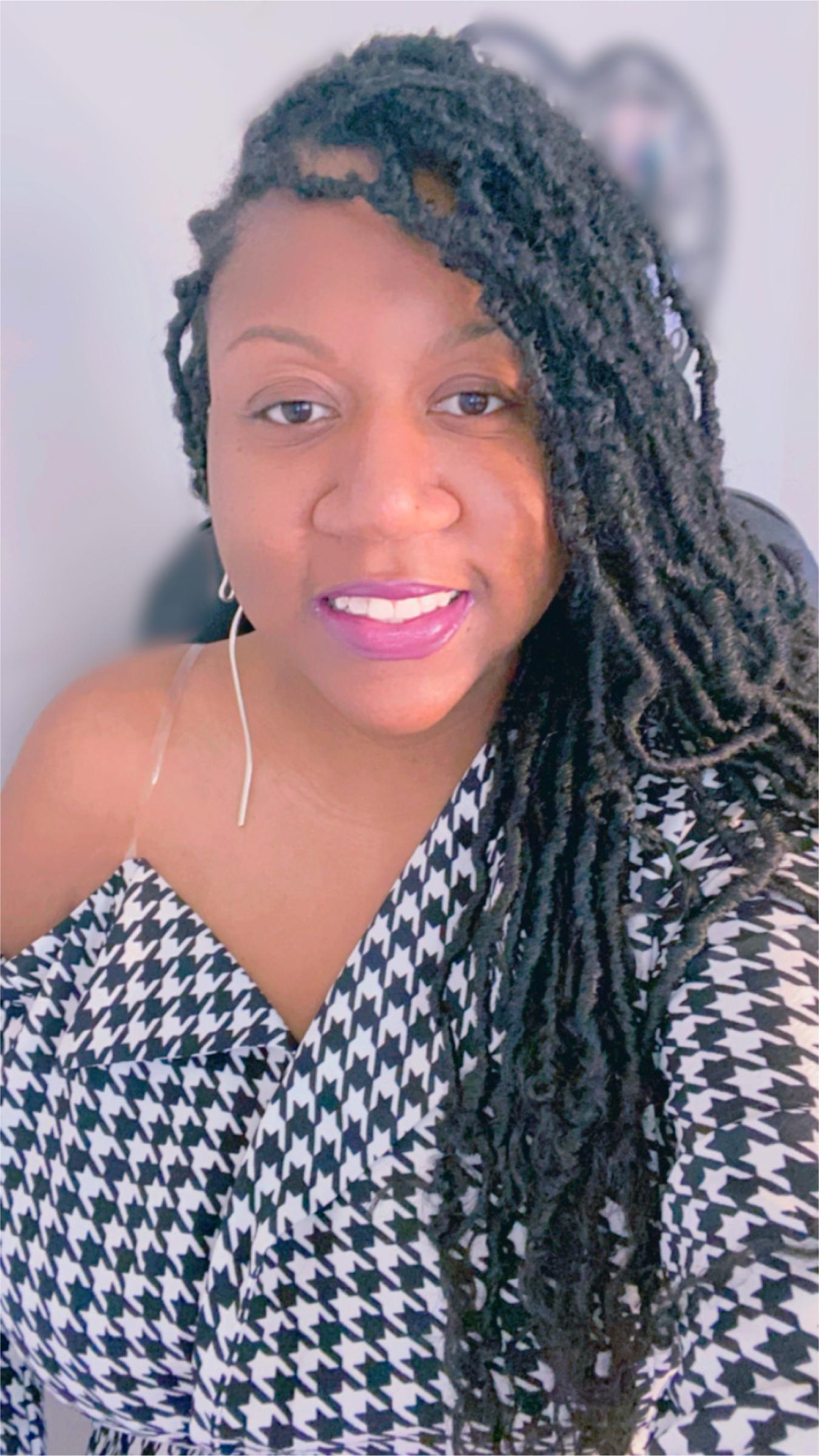Jenni Wolfson grew up in Scotland, a Jewish girl confronting antisemitism that could have silenced her. Instead, it sparked something fierce—a fire that would become the driving force of her life’s work: storytelling as a tool for justice and change. As the first CEO of Chicken & Egg Films, a nonprofit supporting women and nonbinary documentary filmmakers, Jenni has transformed the organization quintupling its annual grantmaking while nurturing a community of 500 filmmakers whose works have shaped the cultural and political landscape.
Films backed by Chicken & Egg have earned Oscar nominations, Emmy nods, and Sundance accolades, films like American Factory,Writing with Fire, Ascension, and The Eternal Memory—stories that expose truths, illuminate lives, and move audiences to action. And her commitment has not gone unnoticed. The Women’s Media Center honored her with its Lifetime Achievement Award, and DOC NYC named her a Leading Light, titles that seem to affirm what Jenni has known all along: purpose, not fear, is what drives impact.
Jenni herself is a storyteller at heart, but her greatest narrative is the one she’s lived—one defined by risk, resilience, and relentless purpose. “Every time I put myself a little bit outside of my comfort zone,” she says, “I reap the highest reward personally and professionally.”
Learn more about Jenni’s journey and her why in our interview below.
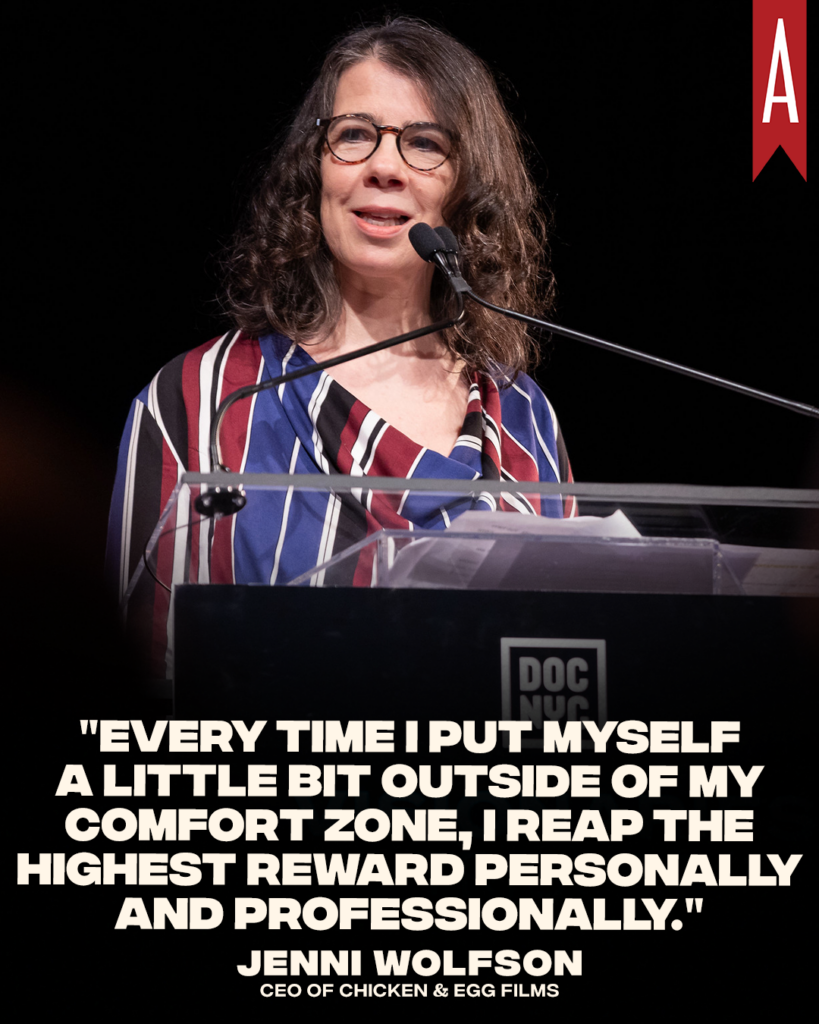
Her Agenda: What is your ‘Why’? Why do you do what you do?
Jenni Wolfson: I want to live in a world where people can live up to their full potential. And I want to live in a world that is driven by love and not hate and fear of people who are different from us. That is what drives me. Chicken & Egg Films supports women and gender-expansive documentary filmmakers all over the world with funding, mentorship, and access. And that is so they can tell stories that ignite change. And so I do what I do because I believe in the power of storytelling to make the world a better place.
Her Agenda:How significant is your upbringing in correlation to the work you do?
Jenni Wolfson: It’s so important. In fact, I don’t think I would be doing what I’m doing now if I didn’t have the experience that I had growing up in Scotland. And I was one of just a few thousand Jewish people in the whole country, and so I grew up with a whole lot of antisemitism. I would get to the front of the dinner line with my tray of food, and the older students would be like ‘Jew to the back.’ So I grew up, and I wasn’t religious, so I was like, ‘wow, there’s so much ignorance out there and fear.’ Most people who were either antisemitic or racist hadn’t even met someone from a different race or a different religion. It’s a long securitist way but I feel like being outraged by injustice, I was also very much activated by it. And so that is so much what has driven me to work in the field of social justice.
Her Agenda: Is there another profession you think you’d be doing if you didn’t have a significant impact from your upbringing?
Jenni Wolfson: I used to think I would be a spy [chuckles]. I don’t know if that was because I was really good at hiding things from my parents, but I also thought I would make a really good spy. And I was quite good at languages as well. I’m not sure I would have ever become a spy, but that’s the alternative career path that I can think of.
Her Agenda: If you could identify one word to describe Chicken & Egg Films, what would it be and why?
Jenni Wolfson: The word would be expansive. And that is because of the breadth, depth, and reach of our work. We support documentary filmmakers all over the world. We support stories about all issues, from reproductive rights to criminal justice, immigration, gender violence, and so much more. And we support filmmakers at all stages of filmmaking and all stages of their careers. So expansive comes to mind.
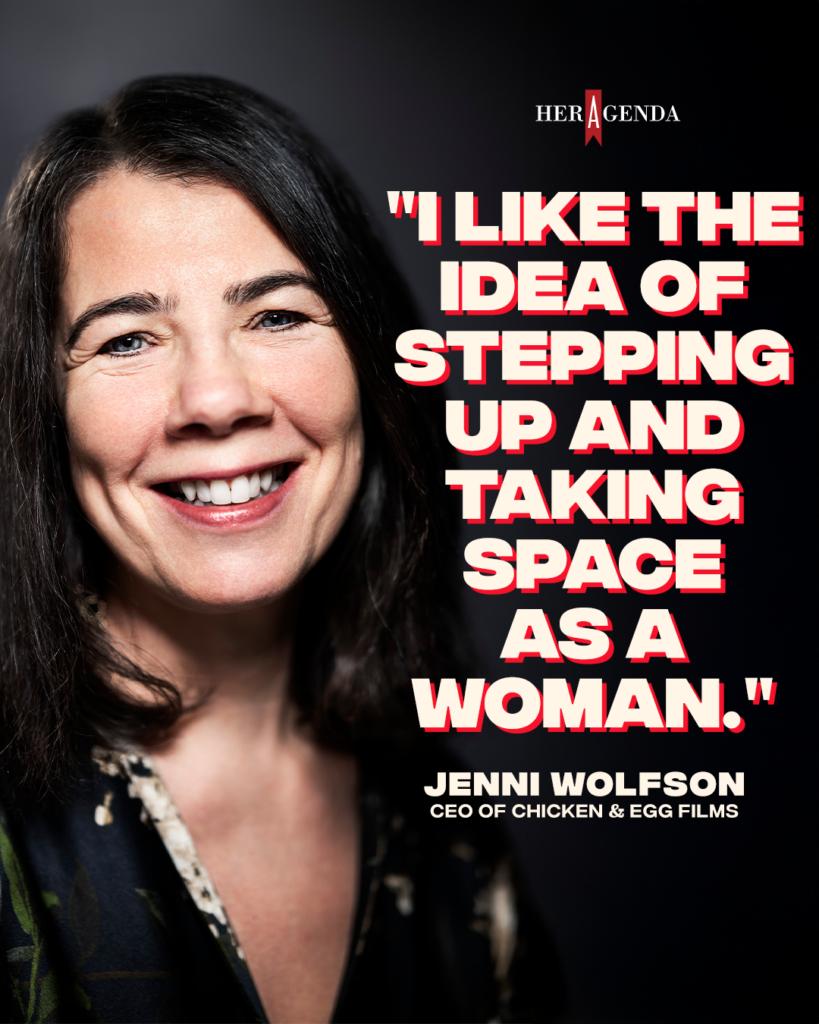
Her Agenda: With your background in activism, is there a goal for expanding your reach?
Jenni Wolfson: So I think the biggest challenge that our organization and all documentary filmmakers and film organizations are experiencing right now is distribution. There is no shortage of cinematic impactful films that are being made, but there are more limited opportunities to have those films seen and distributed. And I believe that there’s an audience out there who wants documentary films. I don’t think we should underestimate our audiences. And as much as I like to watch entertainment and stories about celebrities, I think people do want real stories about real people, that both represent their communities, but also open a window to a world that they might never see. So I hope that this year we will expand more into educational, digital, and new platforms, to reach the millions of documentary audiences out there who don’t have an opportunity to see enough good films.
Her Agenda: Did you always envision becoming the CEO of any company?
Jenni Wolfson: No, I think my dad probably did [chuckles]. When you’re the CEO of a nonprofit that usually includes a lot of fundraising, and nobody becomes the CEO because they want to go out there and try to get money to run your organization, that is a tough part of the job. But I see that part of the job as movement building, relationship building, and advocacy and communication. So I’ve come to love that part of my job for the most part. But I don’t think I ever had a plan, I was sort of a one-day-at-a-time person. So I’ve had leadership roles in the past, and I’ve even been an interim CEO of my previous organization. And I’d also been in leadership roles when I worked with the UN (United Nations) and UNICEF where I was the only woman on the leadership team. So I like the idea of stepping up and taking space as a woman.
Her Agenda: What was your ‘AHA’ moment that made you realize you’re doing what you’re supposed to be doing? Or living in your purpose?
Jenni Wolfson: Ouuu my ‘aha’ moment. Probably my aha moment was when I got my first proper job with the United Nations, going with the UN High Commissioner for Human Rights to Rwanda right after the genocide to investigate human rights abuses. That was a risky job to take that entailed moving across the world to do something I’d never done before. There was a moment when we sadly lost colleagues, and many people left the UN in Rwanda after that time, and I stayed, I knew I didn’t want to die from my job, but I also knew I wouldn’t stop doing it. And so I think in those early years, I realized that this is the work that I want to do, and I felt very connected. I don’t know that there was one aha moment, but it was very clear that this was a job that I was willing to take risks for.
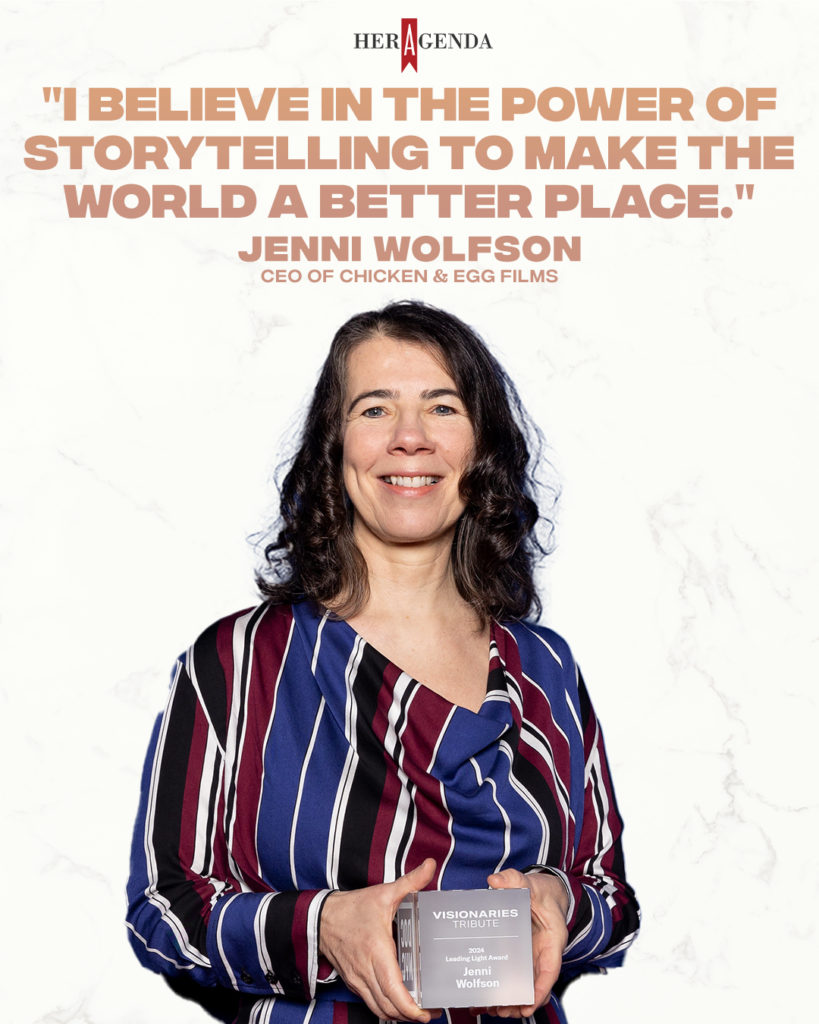
Her Agenda: What has been your greatest accomplishment thus far in your career?
Jenni Wolfson: The courage to take jobs that always seem like a stretch. I once got amazing advice from an executive coach when I said to him, ‘I don’t know if I’m qualified to do this job’ when I was thinking of applying. He said, ‘It’s not your job to decide if you’re qualified, that’s their job, it’s your job to decide if you want it.’ And so I think that always being driven by purpose and mission, not letting fear stand in the way, and realizing time and time again that every time I put myself a little bit outside of my comfort zone, I reap the highest reward personally and professionally.
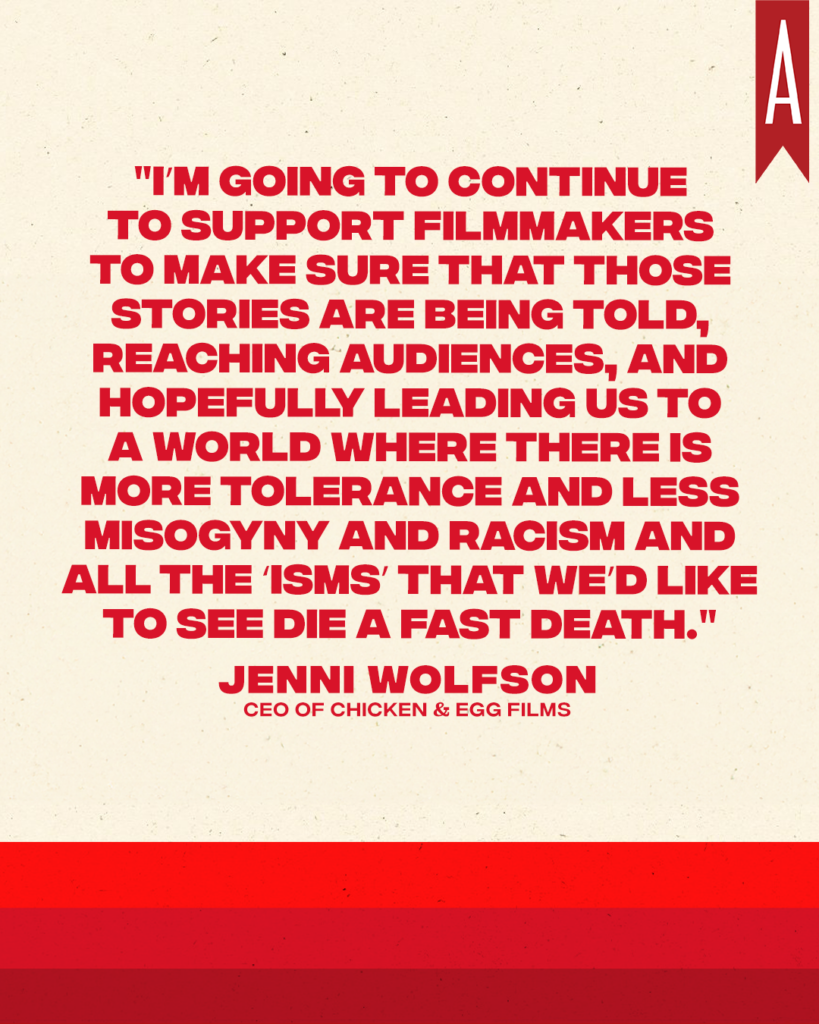
Her Agenda: What is your greatest passion in life that you’d do for free?
Jenni Wolfson: Travel [chuckles]. I love to travel. And I’d love to travel for free, can you make that happen?
Her Agenda: [chuckles] I wish, I would join you. That sounds amazing!Last question here. What do you project your next power move to be in 2025?Jenni Wolfson: I think post the US election in a world where the narratives that are being told don’t always reflect the reality of the world we live in, I think my next power move is my current power move. It is that stories and narratives change are so crucial to expanding people’s hearts and minds. And I think we need that now more than ever. I think we need films that inspire empathy, learning, and action. And so I’m going to continue to support filmmakers to make sure that those stories are being told, reaching audiences, and hopefully leading us to a world where there is more tolerance and less misogyny and racism and all the ‘isms’ that we’d like to see die a fast death.
[Editor’s note: This interview has been edited for length and clarity.]

